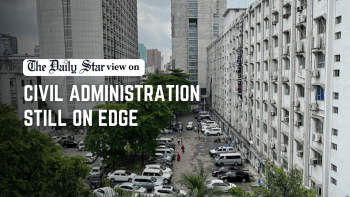New DCs should be urgently appointed

We are concerned about the delay in appointing deputy commissioners (DCs) in 25 districts which has resulted in a governance vacuum. At least 13 days have passed since the interim government withdrew the DCs from various districts, including Dhaka, Gazipur, Chattogram, Mymensingh, and Cox's Bazar, reassigning them to different ministries, directorates, and other offices. As a result, additional deputy commissioners are now having to fill in for the DCs.
The DCs serve as administrative heads in their respective districts, playing a vital role in overseeing local governance and ensuring the effective delivery of many public services. They have also been recently tasked with the additional responsibility of supervising zilla parishads and municipalities, replacing mayors and chairmen. Given that, the delay in appointing new DCs is significantly hindering district-level operations. Since the fall of the Awami League government, we have observed increasing difficulty in the functioning of public offices. The resulting chaos within the civil administration has led to numerous disruptions in regular activities and services. And while many of these issues were expected given just how intertwined the previous regime became with all aspects of governance, the interim government should have planned better with respect to appointing new DCs so that some of this chaos could have been better mitigated.
For example, along with transferring the DCs, the government also dissolved the governing bodies of secondary and higher secondary educational institutions, as well as district and divisional sports councils. Consequently, the responsibility for overseeing these institutions and forming new committees fell to the DCs. However, because many of the DCs themselves were transferred, the formation of committees for educational institutions and sports organisations has been stuck in limbo. Additionally, the large-scale transfer of DCs has reportedly alarmed field-level officials who claim that the fear of being transferred is hindering their routine work, which is unacceptable.
Usually, the government first appoints new DCs before transferring the existing ones, or the two processes are done concurrently. However, although it is disappointing that the interim government ordered the transfer of nearly half of the district DCs without preparing a list of replacements, we must acknowledge the over-politicisation of civil service by the previous regime that has been particularly detrimental in this regard. As a result, the interim government has been extremely cautious in appointing new DCs, as it does not want to rely on the list of officials prepared by the previous administration. Be that as it may, the government urgently needs to sort out the DC appointment issue and bring back some discipline so that the delivery of public services is not hampered for much longer.


 For all latest news, follow The Daily Star's Google News channel.
For all latest news, follow The Daily Star's Google News channel. 






Comments